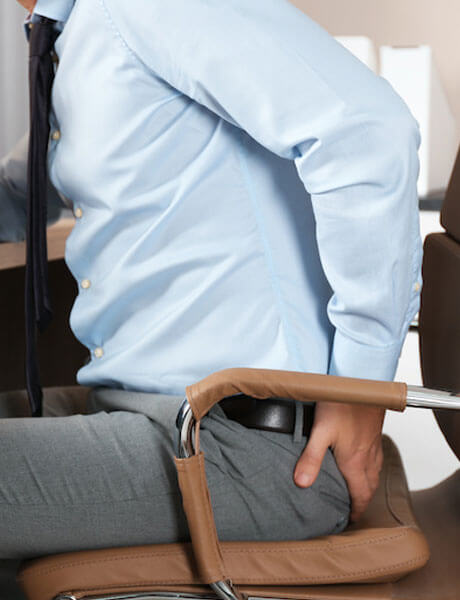- POWERFUL SURGICAL SOLUTIONS FOR YOUR HEALTH
- Phone: (201) 833-2888


Peri-anal/peri-rectal abscess is an acute condition which is characterized by swelling and pain near the anus, and often associated with fever. The infection originates most often from an obstructed anal crypt gland, with the resultant pus collecting in the subcutaneous tissue space near the anus. Once diagnosed, anorectal abscesses should be promptly drained surgically.
The goal of the treatment is to eliminate the accumulated pus content as soon as possible with an incision and drainage. This can be done in the outpatient setting with local anesthetic. Antibiotics may be prescribed for presence of cellulitis. Cultures are typically obtained to target the bacteria involved in the infection.
An incision is made in the skin above the swollen area and the contents are eliminated. Relief of the pus under pressure helps relieve the pain.

Anorectal Fistula is a chronic condition that is often associated with peri-rectal abscess. The fistula represents the tract or path of least resistance for the bacterial infection to form an abscess. If not treated, this often leads to recurrent infections.
This condition is chronic, which means that patients can have problems for years, before opting for surgery, which is the only way to solve the problem.
Once the acute infection or abscess is treated and healed, fistulas are treated electively with surgical disruption of the tract to prevent recurrence of infection.
Hemorrhoids are normal vascular structures, or plexus of dilated vessels, in the anal canal. They can be located above (internal) or below (external) the dentate line. Hemorrhoidal disease includes bleeding, itching, protrusion through the anal canal, and thrombosis (clot).
Hemorrhoids can become enlarged and symptomatic due to constant stress during bowel movements (straining), and constipation.
External hemorrhoids can become painful and enlarged due to organization of a blood clot within the hemorrhoidal tissue, or thrombosis. This will typically resorb and resolve spontaneously, but in some cases excision and evacuation of the blood clot can help alleviate the pain quicker.
Internal hemorrhoids are not typically painful, but can lead to bleeding and prolapse, or protrude outside the anus. Rubber ban ligation can be performed in the office and can help alleviate the symptoms related to internal hemorrhoids. Ongoing symptoms in spite of medical and office-based treatments usually requires surgical intervention, which include transanal hemorrhoidal dearterialization or formal hemorrhoidectomy.
Sitz baths, stool softeners, and avoiding constipation with fiber supplementation are key in hemorrhoidal management.
Disruption or trauma to the anoderm with passage of hard stools can lead to severe pain and anal spasms. Treatment includes prevention of anal spasms with topical medications to promote healing of the fissure. Supportive treatment with sitz baths and fiber assist in the healing.
Anal fissures refractory to medical management may require surgical intervention with sphincterotomy (partial cutting of the sphincter muscle) to reduce the pressure and tone of the anal sphincter and promote healing. Although the risk is low, this procedure may increase the chances of fecal incontinence.
Typically seen in older women, particularly those who are multiparous, prolapse of the rectum occurs secondary to weakening of the pelvic floor muscles in combination with chronic straining, diarrhea, and/or constipation. It can present as a “mass” that protrudes through the anus with defecation and reduces spontaneously or requires reduction manually. The “mass” that is described is the rectum which telescopes on itself.
Diagnosis is made on physical exam, on the observation of rectal protrusion with straining (or Valsalva maneuver), or defecography. It can lead to incontinence of both stool and urine, pain, bleeding, and diminished quality of life.
Initial management focuses on patients’ symptoms and includes increased fiber and water intake to reduce chronic straining, diarrhea, and/or constipation. Pelvic floor exercises may help strengthen muscles that are involved in prolapse.
Surgical treatment may be required for patients who fail medical management or whose risk of incarceration (or rectum that can’t be reduced) is high. Surgical intervention can be performed via the abdomen or perineum. Both techniques aim to shorten the amount of redundant colon to prevent telescoping.
When the cause is unknown, the person may be helped with anti-inflammatory drugs.
Proctitis is an inflammation of the lining of the rectum.
The disease can affect 2,510 cm of the lower part of the rectum. Some cases respond immediately to treatment, while others are persistent or recurrent and require prolonged treatment. Some cases eventually progress to ulcerative colitis.
There are several reasons that a patient may develop Proctitis. It can result from Crohn’s disease or ulcerative colitis. It can also occur due to sexually transmitted diseases (such as gonorrhea, syphilis, infection with Chlamydia trachomatis, herpes simplex virus or cytomegalovirus).
Proctitis may be caused by specific bacteria such as salmonella or the use of antibiotics that destroy normal intestinal bacteria and allow other bacteria to grow in their place. Another cause of proctitis is radiotherapy of the rectum or its surrounding area.

Antibiotics are best used to treat proctitis caused by a specific bacterial infection. When proctitis is caused by an antibiotic that damages normal intestinal bacteria, harmful bacteria that have replaced normal ones should be destroyed with metronidazole or vancomycin.
When the cause is unknown, the person may be helped with anti-inflammatory drugs.

Hemorrhoids are swollen tissue that contains veins and is located in the wall of the rectum and anus.
Hemorrhoids can be inflamed, they can form a blood clot (thrombus) or they can become enlarged and bulge. Hemorrhoids that remain in the anus are called internal hemorrhoids, and those that protrude outside the anus are called external hemorrhoids.
They can occur due to constant stress during bowel movements (defecation), and constipation which increases the stress even more. Hemorrhoids are sometimes caused by liver disease, which increases the blood pressure in the portal vein.
A doctor can easily diagnose inflamed, painful hemorrhoids by observing the anus and rectum. Anoscopy and sigmoidoscopy help the doctor assess if the patient has a more serious illness such as a tumor.
Usually, as long as they do not cause symptoms, hemorrhoids should not be treated. Taking substances that relieve constipation can be of huge help. Bleeding hemorrhoids can be treated by injection sclerotherapy, which is injecting a substance that causes the veins to become clogged with scar tissue.
Large internal hemorrhoids and those that do not respond to injectable sclerotherapy are tied with rubber bands. A procedure called rubber band ligation leads to painless reduction and deterioration of hemorrhoids.
Hemorrhoids can also be removed by laser or infrared radiation.
If none of these treatments work, then surgery is an option too.
Wound care instructions and pain medication will be provided by your surgeon
Ready to get started?
Visit any of our convenient locations in Bergen Country or fill out the form to contact us today!
The goal of the treatment is to eliminate the accumulated pus content as soon as possible. As this is the only effective way at this stage of the disease.
An incision is made in the skin above the swollen area and the contents are eliminated. Immediately after this intervention, the patient feels significantly relieved, the pain and the fever are gone.
Our surgeons offer comprehensive surgical solutions and specialize in laparoscopic and robotic, minimally invasive surgery, which means less pain, shorter hospital stay, and quicker recovery time, so you can get back to your daily life.

Copyright 2024 by Heritage Surgical Group. All rights reserved.